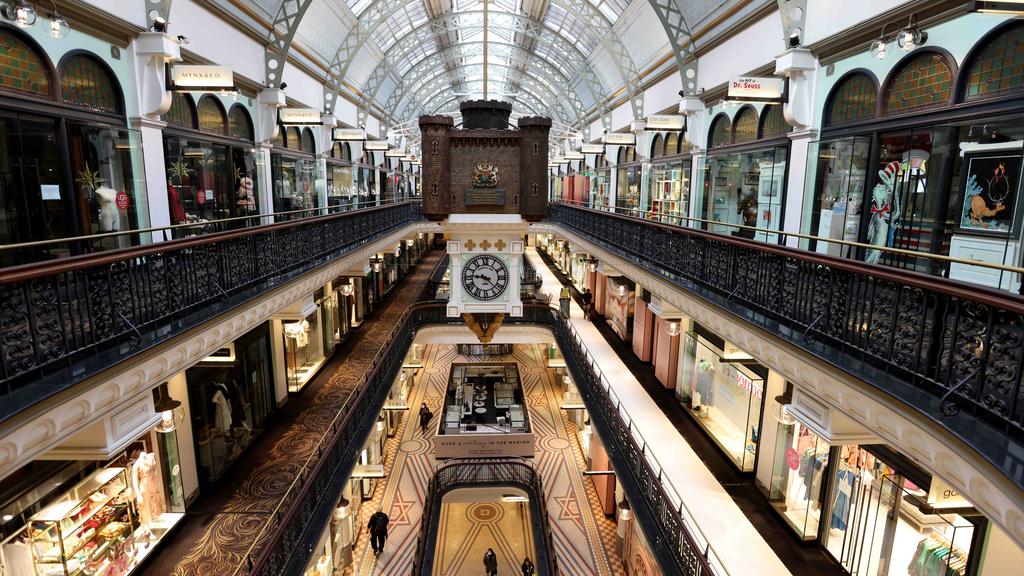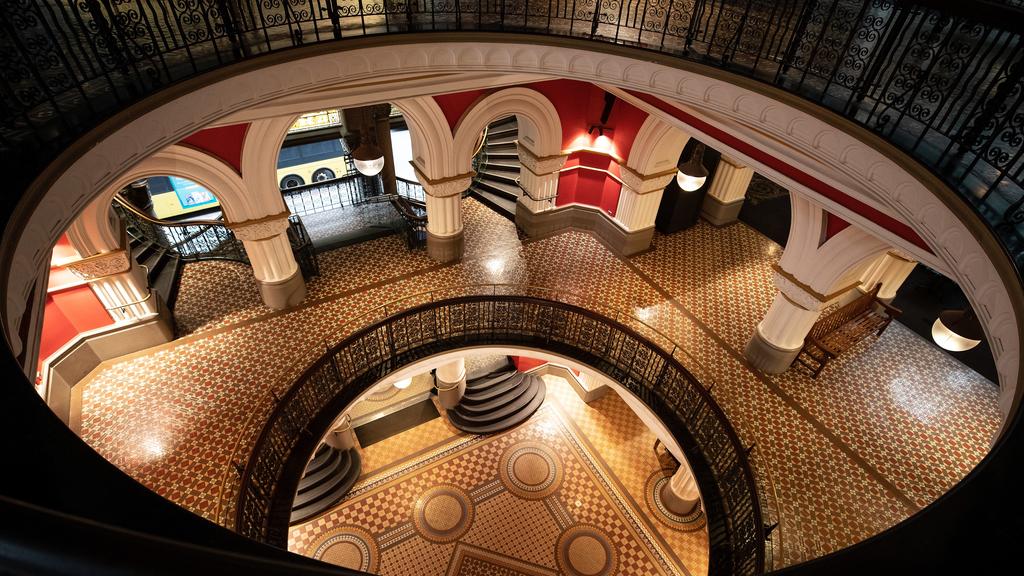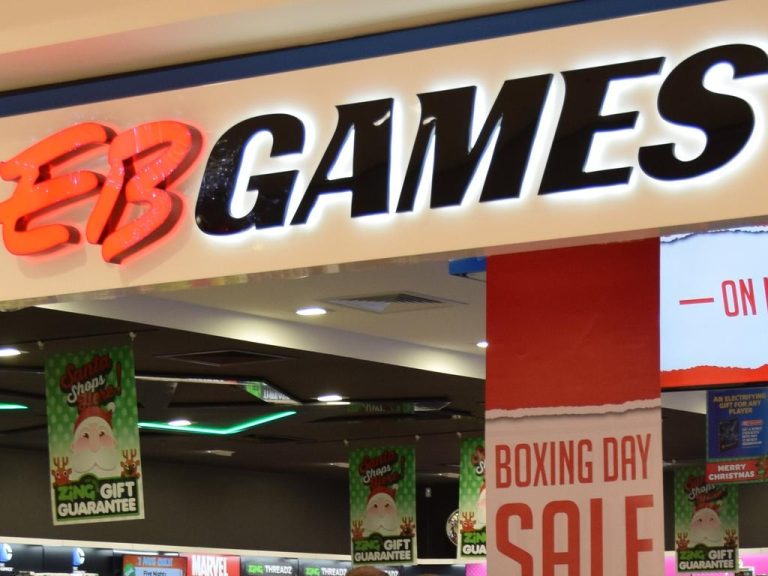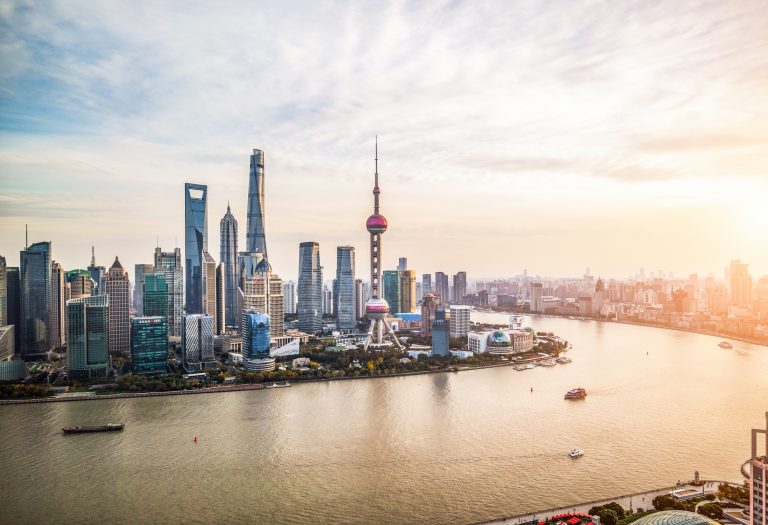QVB deal by Hong Kong giant to bring city retail back to life

Queen Victoria Building, above inside is a historic five-level shopping centre in Sydney’s CBD. It originally opened in 1898 Picture: NCA NewsWire / Damian Shaw
Slices in three of the country’s best loved shopping centres – The Queen Victoria Building, The Galeries and the Strand Arcade – that sit in the heart of Sydney are being targeted by Hong Kong’s Link REIT.
The play for half interests in the trio of assets values them at more than $1bn and is one of the first solid signs that city retail will come back from the pandemic, just as state road maps point to an economic reopening by Christmas.
Lockdowns had smashed the performance of city malls and a slow recovery is still tipped in some quarters as workers trickle back into office towers. But big global investors are looking to grab tightly held properties that rarely, if ever, hit the market, as they can see a resurgence in prime assets in global capitals that have already reopened.
The three retail gems were kicked into play by Singapore’s sovereign wealth fund GIC, which will receive about $500m for its half stakes in the properties. Their values shifted down during the pandemic but did not plunge, with the sale a sign of confidence that will reverberate through other city assets.
The deal is a coup for Link REIT, Asia’s largest real estate investment trust, which had already been buying in China and Britain in the wake of the pandemic.
It forged into Australia two years ago, snapping up an office building beside Westfield Sydney from US private equity company Blackstone for about $683m. Buying offices was a departure for Link REIT as it mainly owns shopping centres and it had since been scouting for major retail assets.
Link REIT is working on the deal with local funds manager EG, which it tapped in March to support its expansion in Australia. EG both assists in managing its local investments in Australia and also “managing the strategic approach to Australian acquisitions on behalf of the Hong Kong-based investor”.
The companies and agents appointed to sell the GIC interest – CBRE and Colliers International – declined to comment.
But the deal fits well with Link REIT’s global pursuit of core properties. It also bought an office block at London’s Canary Wharf during the pandemic.
“Link REIT is eager to work closely with EG to deliver our key market expansion and accomplish our vision to be a world-class real estate investor and manager,” Link REIT chief strategy officer Eric Yau said in March, when their tie-up was unveiled.

Queen Victoria Building, part of the interior. Picture: Getty Images
The move on the three shopping centres comes after city economies were slugged by lockdowns in Sydney and Melbourne. This prompted speculation about underused office buildings being turned over to other uses, but the big money is now paying up for premium office and retail assets in the city.
Luxury retailers are still keen to take up city stores in unique properties, with Dolce & Gabbana signing up to 25 Martin Place alongside Valentino.
GIC is also a believer in cities and has bought offices and hotels during the local coronavirus crisis, as well as diving harder into industrial property by backing ESR’s purchase of the $3.8bn Milestone portfolio and making a play in healthcare property.
Vicinity Centres – which co-owns the centres and manages them – had called out the weakness of its city properties at its recent results, but expects them to recover.
The Sydney centres also differ from large regional malls in the suburbs, which have struggled to draw back in customers despite being promoted as lifestyle destinations. They offer exposure to classic strips such as Pitt Street Mall, which ranks among the world’s most expensive strips, and George St, which has been transformed by the light rail.
In 2017, Vicinity and GIC agreed to swap assets worth a combined $1.1bn, which cut the Singaporean fund’s exposure to the city assets.
The groups exchanged a 49 per cent stake in Vicinity’s Chatswood Chase in Sydney, worth $562.3m, for a 50 per cent stake in GIC’s Queen Victoria Building, The Galeries and The Strand Arcade, worth $556m. The swap allowed Vicinity to gain exposure to the Sydney CBD centres, and it stayed on as manager of the centres.
The impending deal will also help the Hong Kong company as it will also be striking up a tie-up with Vicinity, a top mall operator, which has renewed plans to do more in funds management.
Vicinity valued its half stake in the QVB at $270.3m and it was held at a 5.13 per cent capitalisation rate. The company held its stake in The Galeries City Centre at $146.5m at 5 per cent and its interest in The Strand Arcade at $109.4m at 4.75 per cent.
The QVB is a historic five-level shopping centre in the heart of Sydney’s CBD. Opened in 1898, the destination houses top retailers and international brands, including RM Williams, KENZO, Ralph Lauren, Hugo Boss and Jimmy Choo.
There is more than 140 speciality stores, as well as premium dining in The Tea Room, Esquire Bar + Bistro and Reign Champagne Parlour & Bar.
The Strand Arcade, a multi-level centre in the heart of Sydney’s CBD, was established in 1891. The heritage landmark is the only Victorian shopping arcade remaining in its original form. It features Camilla and Marc, Dion Lee, JB Hi-Fi, Mecca Cosmetica, Scanlan Theodore, Haigh’s Chocolates, The Restaurant Pendolino and more than 65 speciality stores.
The Galeries is a four-level centre, billed as a lifestyle and cultural destination for fashion, art and dining, and features Books Kinokuniya, Incu, JB Hi-Fi, MUJI, The Grounds of the City, Vans, Art House Hotel and more than 60 speciality stores.
Delivering the results, Vicinity chief executive Grant Kelley indicated that the manager saw city retail coming back.
“Despite significant and often prolonged disruptions, consumer and retailer activity during the year demonstrated underlying resilience. In all states, when Covid-19 restrictions eased, consumers were quick to return to retail malls with confidence and the capacity to spend,” he said.
Vicinity said consumers were quick to return to centres when restrictions eased but it tipped a prolonged CBD recovery as the shift to “work from home” and “shop local” remained.
But top centres will benefit from retail store consolidation and retailers targeting high-quality centres. It indicated there was active leasing of flagship stores in its premium assets, notably in CBDs, with general fashion, sports, home and luxury tenants expanding.
In June, Charter Hall teamed up with Abacus Property Group to swoop on a two-thirds stake in the landmark Myer Melbourne building in Bourke St for $270.4m. Singapore’s GIC and fund manager Nuveen sold down and the new pair came in alongside manager and one-third investor Vicinity.







